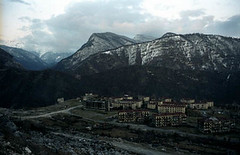Refugees
I got this spooky photo from the internet. It's small and low res, but it captures the atmosphere of what it might be like to live in there.
I was searching for some new places to travel, so I typed Georgia into the search engine. The Caucasus has always fascinated me, although it seems many places in that region of the world are too dangerous to travel. Russia has long sought to destabilise all of the breakaway parts of its former Soviet Empire that lean westwards and out of their sphere of influence, and the region of Abkhazia is no exception. There's a few thousand years of history along the eastern Black Sea coast, but the Soviet legacy of ethnic population movement has led to endless conflict in many areas. The Abkhazian minority declared independence from Georgia in the early 90s, although as yet no country has recognised it. At the end of a nasty war, most of the ethnic Georgians fled, with the expectation to return soon. The political situation has been in stalemate ever since, with Russian support of the separatists enabling the situation to stay as it is, with Georgia refusing to grant anything more than autonomy. Both sides cannot agree on a solution. It's obviously more complicated than just that, but that's basically how it is. Along the border there are lonely refugee towns filled with Georgians wanting to return, living a temporary existence believing that one day they can go back to Abkhazia. There are similar deadlock situations in other ex-Soviet nations, such as South Ossetia, Transnistria in Moldova, the southeast of Estonia, Karelia in Russia/Finland. Not all of these circumstances are in direct conflict, but tensions are simmering.
This is the caption that accompanied this photo:
Zugdidi, close to the Abkhazian border Georgia, January 2003.
An un-named town on the border with abkhazia. Once it was town built to house construction workers building a Dam during Soviet times. Now most of it is abandoned but for a number of refugees. There is no running water or electricity any more. In winter it can drop to -40 and it is 60 miles from the nearest town on very bad roads. It is a harsh and lonely place to live.
I was searching for some new places to travel, so I typed Georgia into the search engine. The Caucasus has always fascinated me, although it seems many places in that region of the world are too dangerous to travel. Russia has long sought to destabilise all of the breakaway parts of its former Soviet Empire that lean westwards and out of their sphere of influence, and the region of Abkhazia is no exception. There's a few thousand years of history along the eastern Black Sea coast, but the Soviet legacy of ethnic population movement has led to endless conflict in many areas. The Abkhazian minority declared independence from Georgia in the early 90s, although as yet no country has recognised it. At the end of a nasty war, most of the ethnic Georgians fled, with the expectation to return soon. The political situation has been in stalemate ever since, with Russian support of the separatists enabling the situation to stay as it is, with Georgia refusing to grant anything more than autonomy. Both sides cannot agree on a solution. It's obviously more complicated than just that, but that's basically how it is. Along the border there are lonely refugee towns filled with Georgians wanting to return, living a temporary existence believing that one day they can go back to Abkhazia. There are similar deadlock situations in other ex-Soviet nations, such as South Ossetia, Transnistria in Moldova, the southeast of Estonia, Karelia in Russia/Finland. Not all of these circumstances are in direct conflict, but tensions are simmering.
This is the caption that accompanied this photo:
Zugdidi, close to the Abkhazian border Georgia, January 2003.
An un-named town on the border with abkhazia. Once it was town built to house construction workers building a Dam during Soviet times. Now most of it is abandoned but for a number of refugees. There is no running water or electricity any more. In winter it can drop to -40 and it is 60 miles from the nearest town on very bad roads. It is a harsh and lonely place to live.



5 Comments:
There are similar deadlock situations [...] in the southeast of Estonia
Hello! As an Estonian I would be thrilled if you expanded upon that part of the story. Do you think that the population of South-Eastern Estonia wants to live in Russia? Or something else?
Hi there Jack,
Thanks for your comments! I don't know too much about your country, but I travel extensively around there a few year ago and I loved the place. I am always wanting to know more. I had an amazing experience in Narva, and locals told me about the dramas with the Russians there.
I noticed you had a blog yourself, i'll have to check it out. Cheers,
Grant
sorry, as you can see, I'm writing only in Estonian. if you want to know more about the country, I recommend palun.blogspot.com, the author is an American journalist recently moved to Estonia.
the "dramas" seem to be a bit exaggerated abroad. If I'd have to put it shortly, there is absolutely no perspective of civil war nor ethnic cleansing in Estonia ;-) that being said, I think that there are things that can be (and will be) done to improve the Russian minority's situation in society. I guess this goes for all the minoritys almost everywhere in the world, though.
... in addition of aforementioned blog, I suggest the official page of our Foreign Ministry, it's in English as well.
http://www.vm.ee/eng
Cheers for your tips! Will check all of these out.
Post a Comment
<< Home